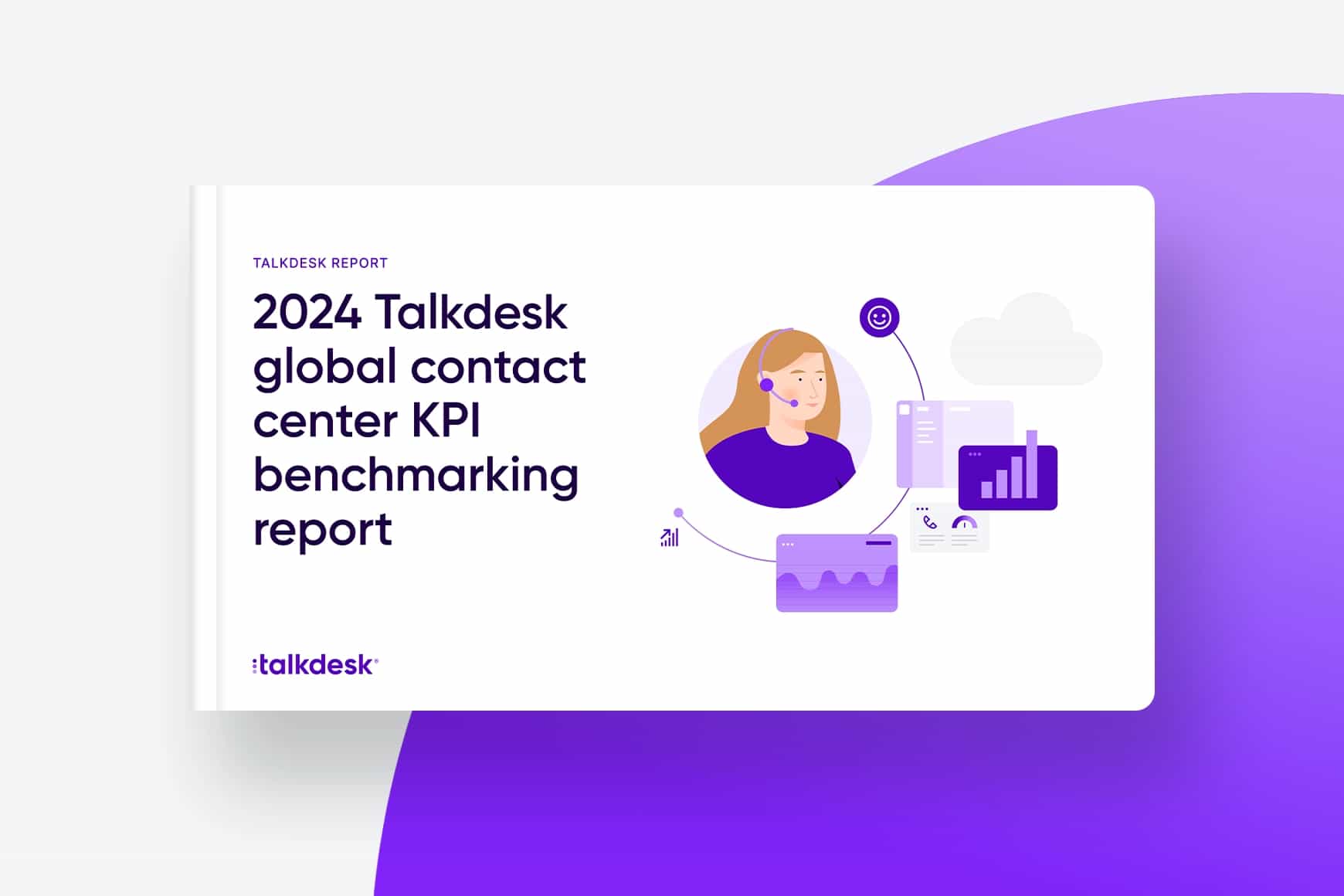What is CCaaS? An overview of the benefits of contact center as a service

By Taylor Johnson
0 min read

On-premises contact center solutions are becoming obsolete as they fail to meet the quickly evolving demands of the digital era.
Conversely, contact center as a service (CCaaS) platforms keep companies at the forefront of the innovation curve, offering greater agility and growth opportunities. CCaaS gives companies the freedom to break free from complex and expensive solutions and concentrate on what is most important: their customers.
What is CCaaS?
CCaaS platforms allow companies to communicate with their customers over a wide variety of channels—digital, voice, social, SMS, chat—and capture critical customer and employee data from those interactions to improve the customer experience. They can be powered by artificial intelligence (AI), but all CCaaS platforms are hosted, or built natively, in the cloud. CCaaS providers maintain and develop the software (hence “as a service”), allowing customer service teams to focus on using the software to provide better customer experiences.
CCaaS solutions are necessary for modern businesses because they provide the means to support the type of omnichannel experience that today’s customers expect.
It joins all the parts of an on-premises contact center, such as the interactive voice response (IVR), computer telephony integration (CTI), contact center analytics, and others into a single cloud-based solution. CCaaS platforms excel at intelligently routing contacts across all communication channels, automating key tasks, and providing self-service options for customers.
Cloud-based vs. on-premises contact centers.
The fundamental difference between a cloud contact center and an on-premises one is who owns and manages the system. A contact center on-premises has everything in a physical location. The software, hardware, and other resources are hosted in a contact center building and managed by a company’s IT team.
In a cloud-based CCaaS platform, it is the provider, not the company that owns and hosts the software and hardware. The provider also maintains and updates the platform. This eliminates the need to purchase hardware, oversee continuous upgrades, troubleshoot any issues, and manage physical infrastructure.
The costs of these two solutions also set them apart.
On-premises contact centers come with a large up-front cost. Whereas, with CCaaS, companies can buy only the technology they need, paying monthly or annually. This provides great flexibility and cost-efficiency as businesses may opt for different pricing models and scale up or down depending on emerging needs.
The benefits of CCaaS software.
1. Omnichannel customer experiences.
Today’s customers expect issues to get resolved rapidly on their preferred channel–whether it’s SMS, live chat, WhatsApp, or a phone call. They also want to seamlessly move across channels and not repeat all their information and story to the next agent in queue.
Talkdesk CX Cloud™ enables this type of omnichannel experience by supporting all your channels in a single customer service agent workspace. When a customer contacts an agent, the agent is able to see the customer’s entire history, including summaries of past conversations and a transcript of the customer’s interaction up until that point.
Additionally, our AI-powered assistant, Talkdesk Copilot, helps agents quickly gather the context of the customer’s query, allowing them to jump right into the conversation without asking redundant questions.
2. Automated self-service options.
Automated self-service is another driving element for companies to adopt a CCaaS platform.
Self-service options often improve customer satisfaction, as the queries are addressed instantly. Customers can get the answers to their questions within minutes, without having to reach out to a contact center or spend time waiting for a response.
Self-service also decreases call volume and the number of customer service requests agents are receive. This decreases the average wait time across your entire contact center and keeps your agents available to provide support for customers with more complex issues. This can also be very helpful during times of high call volume when agents are already stretched thin.
3. Cost savings.
CCaaS platforms can provide financial flexibility by offering annual or pay-as-you-go plans, allowing you to adjust expenditures as your needs evolve. It also removes the need to deploy IT resources to manage the software and hardware.
All of these are the responsibility of the cloud provider.
A CCaaS solution also enables a faster return on investment as deployments typically only take weeks.
4. Flexibility and scalability.
Paying for only what you need means companies can rapidly scale their CCaaS software up or down.
Go from 1 seat to 100 to 1000 in minutes and scale down with the same speed. Seamlessly add extra agents, features, and functionality according to your dynamic business needs and seasonal demands.
5. Access to cutting-edge AI technology.
The Talkdesk Ascend AI platform allows companies to reap the benefits of artificial intelligence across their contact center:
-
Automatic summary, powered by the same generative AI as ChatGPT, automatically summarizes customer interactions, including intent outcome, disposition, and next best actions.
-
Talkdesk Knowledge Management grows, refines, formats, and orchestrates information that powers tools like Agent Assist and Virtual Agent to help agents and customers resolve issues faster.
-
Talkdesk Autopilot instantly responds to every customer query at any time of the day with a two-way natural dialogue on voice and digital chat channels, with multiple language support.
-
Talkdesk Copilot empowers agents with real-time call transcriptions, contextualized quick answers, next-best action recommendations, and automated pre-call, on-call, and post-call work.
-
Talkdesk Interaction Analytics captures, transcribes and analyzes every customer interaction to identify key conversation moments, topics and sentiment that help you understand customer intent, uncover trends and provide actionable insights to the business.
-
Talkdesk QM Assist adds a speech analytics layer to your standard Quality Management tools with searchable transcripts, sentiment analysis, and automated interaction scoring.
-
Talkdesk AI Trainer non-technical customer service staff can easily apply their practical expertise to continuously improve AI models powering automations in the contact center.
-
Talkdesk Guardian provides visibility into your remote and hybrid contact center workforce and mitigates the risk of a distributed workforce, including insider threats, negligence, and system performance.
-
Talkdesk Identity quickly and securely verifies caller identity with voice biometrics, connecting customers with agents faster with real-time, self-service authentication.
6. Improved agent support and experiences.
Talkdesk CX Cloud unifies all the tools and applications that agents need to handle customer interactions within a single workspace. It was specifically built with user-friendliness in mind, flattening the learning curve for agents, supervisors, and administrators.
Agents don’t lose time navigating back and forth between applications, and the integrated features empower them to find answers more quickly. Talkdesk support all communication channels—from calls to messaging apps to bots—helping businesses deliver a seamless customer experience, regardless of the channel. Automatic reporting features and library of templates provide powerful customer experience analytics and other contact center performance metrics.

talkdesk report
Talkdesk 2024 KPI benchmarking report for contact centers
Get a snapshot of your contact center’s performance in the age of generative AI, see how it compares to industry peers, and discover tips for optimization.
7. Seamless integrations.
The contact center is at the nexus of many operations and requires integrations with numerous enterprise systems—CRM, ticketing, order management, HR, payroll, and marketing operations, to name a few. CCaaS platforms that provide out-of-the-box integrations with these types of systems greatly accelerate time to value and improve the performance and security of business systems.
Talkdesk CX Cloud includes over 70 out-of-the-box integrations, such as Slack, Salesforce, and Microsoft Teams, as well as industry-specific integrations, such as Epic and Fiserv.
For more custom or bespoke integrations, Talkdesk Connections allows integration with any third-party system using low-code.
The evolution of call center software.
Just 15 years ago, contact centers were primarily run with on-premises software systems. A few legacy providers of on-premises call center software cornered most of the market until the late 2000s.
That’s when new software companies realized the opportunity to take traditional call center software and host it in the cloud.
Instead of accessing the software via specific computers in a call center, agents could now log on to any internet browser and access the same systems. This first wave of CCaaS software offerings included benefits such as lower maintenance costs, the ability to reduce IT headcount, more flexibility for agents who could work from home, and the ability to seamlessly scale up and down.
Despite the success of the first wave of CCaaS solutions, there were still lingering issues.
Their software was built in a transitional time when most code bases were created for on-premises systems and changed to be hosted in a cluster-based environment in the cloud.
This resulted in significant downtime events, difficulty integrating with third-party cloud applications, and long development and deployment cycles for even the most basic functionality improvements. A single release could take over a month to deploy to all clusters.
What should I look for in a CCaaS provider?
Choosing the right CCaaS provider involves more than just looking for specific capabilities. A truly effective CCaaS provider should be able to offer the latest contact center technologies while making implementation easy, secure, and flexible.
Here’s what a CCaaS provider should be able to offer:
A forward-thinking approach to AI.
A strong CCaaS provider is always pushing the boundaries of AI innovation. These leaders don’t just keep up with change—they help businesses stay ahead of it. Their advanced AI tools adapt as customer expectations evolve, ensuring the contact center is always ready for what’s next.
Flexible scaling.
Growth brings change, and the right CCaaS provider needs to keep up for the long term. A provider that can scale up alongside a business ensures customer service keeps pace with evolving demands, whether that means adding new channels, adjusting features, or expanding teams. Plus, the ability to scale down means no wasted costs when budgets are tight.
Full integration with business systems.
To stay competitive, businesses need digital systems that work seamlessly together. The right CCaaS provider connects the contact center with tools like CRMs and workforce management software. Agents get the information they need for successful customer interactions, while business leaders get the unified insights they need to make smart decisions.
Data reporting tools.
Top-tier CCaaS providers offer robust data reporting tools that capture valuable insights into customer behavior and service performance. Through real-time analytics and customizable dashboards, businesses can monitor key metrics like first-call resolution, customer sentiment, and overall satisfaction scores. Access to detailed data also allows organizations to spot trends, address issues proactively, and continuously refine the customer experience.
Leading security and compliance standards.
Protecting customer data is non-negotiable. Look for providers that follow industry-leading standards like data encryption and GDPR compliance to safeguard sensitive information. For businesses in regulated industries, it’s crucial to choose a provider that meets specific compliance requirements such as HIPAA, PCI DSS, or SOC 2. Beyond meeting regulations, the best providers actively monitor and adapt to evolving security threats, ensuring that systems remain protected as risks change.
Talkdesk: Modernizing customer service with CCaaS.
The need for better contact center software solutions is on the rise. The worldwide CCaaS market is projected to grow from $6.08 billion in 2024 to $24.45 billion by 2032, driven by automation and generative AI.
Talkdesk is built natively in the cloud with complete micro-services architecture. This delivers the ability to innovate and deploy at a rapid pace with less probability of errors and downtime.
We offer all the benefits of CCaaS, enabling your contact center to provide a far superior customer experience.
Every business, from large corporations to microenterprises, can benefit from a CCaaS platform. Want to learn how CCaaS can improve your company’s customer experience? Schedule a Talkdesk demo today!
FAQs.
CCaaS, or contact center as a service, is a cloud-based solution that simplifies how businesses handle customer interactions. Since it’s hosted in the cloud, there’s no need for hardware or extensive IT support. CCaaS lets businesses manage conversations across channels like calls, emails, chat, and social media, all in one place. With instant access to updated features from the CCaaS provider, and the flexibility to scale up or down as needed, CCaaS helps businesses adapt quickly to meet customer expectations.
UCaaS stands for unified communications as a service, while CCaaS stands for contact center as a service.
UCaaS primarily focuses on integrating various communication tools and services like voice, messaging, video conferencing, and collaboration platforms into a single, unified system. It’s designed to streamline communication across an organization, enhancing connectivity and productivity.
On the other hand, CCaaS specifically caters to contact center operations. It offers tools and functionalities necessary for managing digital customer service, such as call routing, analytics, customer relationship management (CRM) integration, and other features tailored for customer support and engagement.
The reliability of CCaaS depends on several key aspects. Opting for a trusted provider with a proven track record is vital; they can invest in strong infrastructure and redundant systems to minimize downtime. Reliable CCaaS platforms incorporate redundancy by utilizing backup servers, multiple data centers, and failover mechanisms. Scalability ensures seamless operation during increased call volumes. Robust security measures, adherence to industry standards, and consistent audits safeguard against breaches. Additionally, uptime guarantees, responsive support, and regular maintenance contribute significantly to a CCaaS platform’s reliability. Overall, reputable CCaaS providers offer robust, dependable solutions for managing contact center operations.
CCaaS uses cloud-based technology to enable businesses to access contact center tools and services remotely via the internet. Operating without on-site hardware, CCaaS integrates multiple communication channels like calls, emails, chat, and social media into a unified platform for agents. Its cloud-based infrastructure facilitates easy scalability, accommodating fluctuations in agent numbers and operational expansions effortlessly. Managed by service providers, CCaaS relieves businesses of infrastructure maintenance, allowing them to focus on core activities while ensuring efficient and flexible contact center operations.








